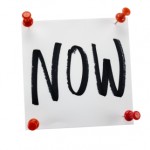Just a small trip back to the early 90’s. As silly as it seems, not much has changed. Well, maybe the background music but definitely not the sentiment.
We live in a society that wants everything now. The faster, the better. We want things yesterday, not in ten minutes. This includes our food, our entertainment, and even our healing.
We want to be better now! We want to take a pill, have it all go away (whatever our IT is), and go on with our lives. Period.
Acupuncture and herbs don’t work that way. (Sorry to bust your bubbles.)
This is (unfortunately) a scenario that sometimes happens here at the clinic:
People come, wanting to try acupuncture. They are excited, it is something new; (or maybe they are nervous because it is something new.) They exclaim they have tried everything else and nothing has worked. Acupuncture is their last hope. They are hedging all of their bets on this.
And then it happens: three, five, seven treatments and their “issues” have not resolved yet. Or maybe there is change but other things are changing, not the issue they came for.
There is frustration, disappointment.
They ask “How long will this take? When can I stop coming?”
We encourage; we know it can be a long process.
They are disillusioned, don’t understand; they want it “now”.
They quit coming, they don’t show up for an appointment, they quit taking their herbs. They jump to another treatment strategy that is going to be “the one.” This time something will work, and fast. It is the best new thing.
You can’t blame them, we all want instant fixes. We live in a society that tells us this is justified, no matter what the topic. We don’t have staying power or follow-through when it gets hard because we are told we don’t need it.
People expect Oriental Medicine to work like Western medicine. And it doesn’t. Oriental Medicine is a whole body approach rather than isolating a symptom or an issue. While Western medicine narrows down, Oriental Medicine broadens. Neither are better or worse, they just work differently; you can’t apply the rules of one to the practice of the other.
It is important to have a clear idea of what to expect when deciding to begin a course of treatment. Rome was not built in a day and the issue you are seeking help for did not materialize over night.
This can be deceiving; it may look like a symptom suddenly broke out but what were the energetic factors and conditions that contributed to it being able to appear at all? How long were these present? How long has the qi been stagnant and not circulating? This is the place that Oriental Medicine attempts to address.
This means that results are gradual. Acute conditions may have relief in a couple of months; chronic conditions may take years. The process is gentle, energetic, and transformative; and not instant.
The process involves taking a look at what habits you have that contribute to the condition and changing them; which can mean lots of self-examination. It also means sticking through when it gets hard. As with any transformation, you have to stay long enough to see the magic; and there is always that dark moment where we are asked if we want to turn back or if we want to keep going.
The beautiful thing about Oriental Medicine is it focuses on body balancing; simultaneously you are affecting areas and issues you weren’t even working on. It is fun to see patients who come in for a session saying something that plagued them for years is suddenly gone, something they did not even think was worth mentioning in the intake; something the practitioner did not even know about.
For those who are patient and have staying power, amazing things can happen. You just have to hang in there, keep putting one foot in front of the other.
And the thing is, when you keep going, eventually does turn into now.

